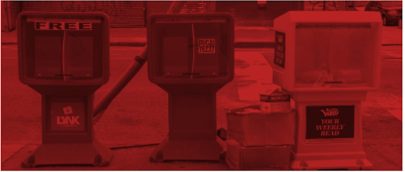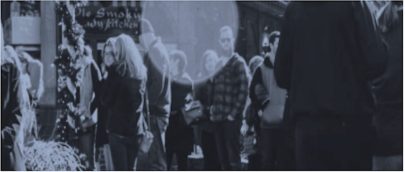State and Local Efforts
More and more state lawmakers are taking a proactive approach to maintaining, understanding and strengthening their local press. Here are some of the most significant efforts, updated as of March 31, 2025:
California
Assemblymember Alex Lee (D-San Jose) has introduced AB 611, which would create a 120-day notice period for the sale of legacy news outlets, with a twist: Employees of the outlet get a 60-day window to make their own ownership bids. California Common Cause, in partnership with Rebuild Local News, is spearheading support for the bill, which expands upon Illinois’ groundbreaking 120-day sale notice law. The bill has been referred to the Assembly Committee on Labor and Employment.
Near the end of the 2024 legislative session, Assemblymember Buffy Wicks (D-Oakland) and Governor Gavin Newsom reached a tentative agreement with Google to establish a fund supporting California newsrooms, with allocations based on the number of editorial staff. The state and Google would contribute $45 million in the first year, followed by $20 million annually. However, the deal has not been reviewed or approved by the Senate, and Newsom’s recent allocation of $30 million for the state’s share of the fund in his 2025-2026 budget proposal did not specify how the money should be spent. The initiative recently faced a setback when UC Berkeley’s School of Journalism announced it would not administer the program, and other universities are in the running to host.
The 2024 Google agreement led to the shelving of two key bills: AB 886, which sought to secure funding for local news through tech platform agreements or fees, and SB 1327, which aimed to levy a fee on digital ad revenues from major tech companies. As part of the deal, Google also committed to continuing its Google News Initiative and Showcase investments as well as participating in as-yet-to-be codified “National AI Accelerator.”
In September 2024, Gov. Newsom signed AB 1511, sponsored by Assemblymember Miguel Santiago (D-Los Angeles), requiring state agencies to develop a plan for increasing spending on ethnic and community media. The passage of this policy was driven by the leadership of the Latino Media Collaborative, California Black Media, and Ethnic Media Services.
In 2022, the state legislature allocated $25 million over three years to the UC Berkeley journalism school to fund fellowships for at least 40 reporters in local newsrooms across California. That funding is now nearing exhaustion after placing multiple classes of fellows.
Chicago
Local journalism advocates passed an advertising set-aside in Chicago in October 2022 via executive order. Chicago Independent Media Alliance, a coalition of publishers, secured an allocation of 50% of Chicago’s government advertising spending for community and ethnic news outlets. Mayor Brandon Johnson has indicated that he will reissue this policy in 2025.
The Chicago Independent Media Alliance (CIMA), which was key in securing the policy, is now led by Public Narrative, a Chicago-based nonprofit that offers resources to promote media literacy and amplify community voices. It will oversee the policy’s implementation, including publishing an annual report on how city ad dollars are distributed to eligible news outlets. Chicago’s initiative is the first government advertising set-aside since New York’s Advertising Boost Initiative, which has already steered millions to community news outlets.
Colorado
Colorado state legislators proposed a tax credit for small businesses to advertise in local news, based on the Local Journalism Sustainability Act in 2022. It drew support not only from journalism groups but from the League of Women Voters of Colorado. It passed the House Business Affairs and Labor committee as well as the Finance Committee but failed to pass the House Appropriations Committee. The Coalition testified in support and worked closely with the Colorado Press Association. The Colorado Press Association is introducing a bill that would create a grant program to address staffing local newsrooms across the state.
Connecticut
The state has introduced a handful of local news bills in 2025. SB1230 was introduced by State Rep. Kate Farrar (D-West Hartford, Newington). It calls for a government advertising set-aside of 50 percent of some state agency ad budgets for local news outlets owned by in-state entities. Farrar introduced a similar bill in 2023 and 2024 – a state-level version of a policy implemented in New York in 2020 that mandates a certain proportion of government advertising spending go to local news outlets. It would have limited the benefits to publications owned and operated in the state of Connecticut.
Rebuild Local News partnered with independent news organizations in Connecticut to once again advance the policy. Other local news bills introduced in Connecticut in 2025 include HB5878, a refundable employment tax credit for news organizations. It establishes a refundable tax credit to news organizations that cover local communities in the state, in the amount of $15,000 per journalist employed in the state by such organization and $25,000 per new journalist hired in the state by such organization, with a cap on the amount a news organization is allowed of $150,000.
Other bills introduced this session include HB6418, which requires 120 days’ notice before the sale of a news organization to an out-of-state buyer. Under this bill, no owner of a news organization that primarily serves any community in the state may sell the organization to an entity not incorporated in the state without providing at least 120 days’ advance notice to the organization’s employees and community members. Another bill, HB6076, seeks to establish and fund at least twelve fellowship positions in local newsrooms for recent graduates of journalism programs at public institutions of higher education.
Meriden, Connecticut
The Record Journal in Meriden, Connecticut got approved for a $300,000 American Rescue Plan-funded advertising grant program. Local businesses and nonprofits applied to participate in the program. Those selected received $4,000 in free advertising, $2,000 of which was paid for with city American Rescue Plan funds and another $2,000 in advertising was supplied by the Record Journal. After the costs of implementing the program, the publication netted $235,000. American Rescue Plan funds are still available until the end of 2024. To learn how you can adapt the program, read Rebuild Local News’ bulletin.
Hawai’i
HB1458 applies a tax on the ad revenue earned in Hawaii by social media platforms with more than a million users in the U.S. (probably Facebook, Instagram, TikTok, X, Reddit, YouTube, Snapchat), with funds being allocated by the state Treasury office to “expand broadband access” and “support local journalism initiatives.” How those funds are distributed is undefined. The bill’s sponsor is Representative Ikaika Hussey (D). The bill is one of multiple bills introduced in 2025, joining those in Oregon and Washington, that seeks to tax Big Tech to sustain and expand local news resources.
Illinois
Sen. Steve Stadelman has reintroduced the Journalism Preservation Act, SB 1732, a “bargaining code” bill aimed at forcing Google and Meta to pay local newsrooms for their journalism, closely modeled on California’s similarly named legislation from 2023-2024.
In May 2024, the Illinois Legislature passed a budget including an employment tax credit to support local news, committing $25 million over five years for newsrooms hiring or retaining local reporters. The subsidy is available to for-profit and nonprofit organizations with at least one full-time local reporter, providing $15,000 per current reporter and $25,000 per new hire. There is a $150,000 limit on how much a single newsroom can receive, and a $250,000 limit for any given corporation.
Additionally, the Strengthening Community Media bill was passed, requiring a 120-day notice to employees and the community before a local news organization can be sold to an out-of-state company. This “replanting” provision, the first of its kind to be passed, gives the community time to organize an acquisition bid to keep local news in local hands. The bill also creates a scholarship program for journalists from Illinois colleges who pledge to work in state newsrooms.
In 2025, the Illinois Department of Commerce released regulations for its refundable tax credit aimed at helping newsrooms hire and retain reporters. The Illinois Press Association is leading efforts to educate newsrooms about the application process.
Maryland
Delegate Linda Foley’s newly introduced HB 1119 would require state agencies to set aside 50% of their advertising budgets for local news outlets. The bill was heard in the Assembly Health and Government Operations Committee on March 10.
A refundable journalist employment tax credit, HB0891, similar to those enacted in New York and Illinois, was introduced by Delegates Vogel and Foley. Newsrooms could claim up to $25,000 per journalist covering local news in Maryland for the first year of the program and then $15,000 for each following year. The bill is not likely to advance this year.
A local news bill introduced by Delegate Mary Lehman in 2025 would create a 120-day waiting period before a local news outlet could sell to an out-of-state company. Under the proposed bill, HB 51, local news organizations would be required to notify employees, the Maryland Department of Labor, and the local county government. This policy mirrors a similar law passed in Illinois in 2024, crafted by Rebuild Local News; founder Steve Waldman endorsed the bill at a January 22 hearing before the House Economic Matters Committee. The Maryland bill will next get its second reading in the House committee.
A tax credit for small businesses that advertise with local news was introduced in 2023 by six legislators, led by Del. Joe Vogel (D-Rockville). HB0540 would have provided a $1,000 tax credit to local businesses who advertise in qualifying local media and $500 in the subsequent years. The bill stalled after the hearing due to the calculated costs of the bill, a familiar issue with the advertising tax credit.
Massachusetts
The subscription tax credit originally proposed in the Local Journalism Sustainability Act was introduced into the Massachusetts House of Representatives. It would offer Massachusetts citizens a $250 refundable tax credit if they purchased subscriptions in local digital or print outlets. As introduced, it’s unclear if the bill would include donations to nonprofit newsrooms, but the sponsoring legislator, Jeffrey Rosario Turco (D-Suffolk), has said the bill will likely be amended as it continues through the legislative process. Later in the session, a version of the Local Journalism Sustainability Act was also introduced.
New Jersey
New Jersey launched the first-of-its-kind Civic Info Consortium in 2018 to provide grants to civic information producers in the state, including newsrooms. Since then it has given out over $5.5 million in grants. Learn more.
A growing coalition of local newsrooms in New Jersey are also in the beginning stages of pursuing a bill that would allocate a portion of government department advertising dollars to community and local news outlets in that state.
New Mexico
State legislators have approved adding $500,000 in the state budget for a local news fellowship, operated by the New Mexico Local News Fund since 2019. The budget awaits Governor Michelle Lujan Grisham’s signature or veto.
In total, the fellowship has placed 18 New Mexico university graduates in local newsrooms. During the 2024 legislative session, the state committed another $200,000 to the program over the next two years. This comes after the legislature appropriated $125,000 during the 2023 legislative session, a measure that won bipartisan support from the Senate Tax, Business and Transportation committee. The funds have helped the New Mexico Fund for Local News add more fellows to the program.
Two news labor subsidy bills introduced by New Mexico Senator and Democratic Floor Leader Peter Wirth failed to make it out of the legislature before the end of the state’s 2025 session.
SB 110 was a refundable local journalist employment tax credit similar to previous employment credits passed in New York and Illinois. It proposed up to $4 million in new annual labor subsidies through 2030 to subsidize as many as 266 New Mexico local journalists per year. SB 110 would have credited up to $15,000 per journalist (30% of a journalist’s wage, capped at $50,000) on a first-come, first-serve basis.
SB 111 was a similar tax credit, creating up to $1 million in new annual support for New Mexico news printers who have been operating in the state for the past five years. The bill would have granted $10,000 per printing employee who works more than 20 hours weekly and $5,000 per printing employee who works less than 20 hours weekly.
New York City
In 2019, after appeals from the Newmark School of Journalism at the City University of New York, Mayor Bill de Blasio issued an executive order requiring that certain city agencies spend at least 50% of their advertising budgets with community newspapers. The policy had been a big success, providing about $25 million over two years to more than 100 local newsrooms. Learn more.
New York State
In February 2025, Senator Rachel May introduced S4401, the latest “bargaining code” bill creating an arbitration mechanism for news publishers to seek compensation from Big Tech, primarily Google. Notably, S4401 is not locally focused and lacks many of the journalist employment, labor spending and transparency requirements of its sibling bills in California, Illinois and Oregon.
In May 2024, the state included the Newspaper and Broadcast Media Jobs Program in the budget, allocating $90 million over three years to New York newsrooms based on the number of employees and their compensation. The program will undergo a regulatory process this summer where stakeholders can weigh in on how it will be implemented. The bill went into effect on January 1, 2025.
In January 2025, New York Senator Monica Martinez (D-Brentwood) introduced the Lift Our Communities Advertise Local (LOCAL) bill, S1865, that would provide tax credits for small businesses – especially women-owned, minority-owned, and disabled veteran-owned businesses that advertise in local news. The tax credit provides up to $10 million a year for eligible businesses to claim a credit equaling eighty percent of their local media advertising expenditures up to $5,000. Rebuild Local News Coalition endorses the legislation.
Oregon
Oregon was one of a few states to introduce a Big Tech compensation measure to support local news in 2025, in addition to Hawai’i and Washington. Oregon’s SB686, a near-copycat of the defunct California Journalism Preservation Act (AB 886) gives tech companies a choice between paying news organizations through 1) payments to newsrooms on a per reporter basis 2) a “bargaining code” arbitration process to compensate for content or 3) putting money into a university-managed civic information consortium that would dispense grants.
A group of lawmakers in Oregon proposed legislation in 2023 that would have included an allocation to the Agora Journalism Center at the University of Oregon along with the Fund for Oregon Rural Journalism (FORJ). Originally the bill also included a tax credit for people to subscribe or donate to local news outlets, but lead sponsor Rep. Khanh Pham (D-Southeast Portland), said during a hearing that the subscription tax credit would be struck from the bill. If passed, the Agora Journalism Center would have used the allocation to study Oregon’s information needs and public policies that would best address them. Additionally, the amended bill would also have funded the Fund for Oregon Rural Journalism and Agora to create a local journalism resource center to help fill urgent newsroom needs around the state. The bill failed in the 2023 session, but advocates remain interested in pursuing public policy to support local news in upcoming sessions.
San Francisco
In March 2023, the San Francisco board of supervisors approved a resolution that will mandate city departments disclose how they spend their advertising budgets in addition to encouraging departments to spend at least 50% of their advertising dollars with community, ethnic and hyperlocal outlets. The proposal represents a new approach to leverage local advertising dollars. The provision comes just short of a mandate, but outlines strong and detailed transparency requirements that will give local news outlets a better bargaining position in increasing city advertising spending. San Francisco State University has also stepped in to help implement this provision, ensuring that local news outlets get registered as city contractors, an important first step in accessing city advertising dollars, and studying the level and result of city advertising spend.
Washington
One of a few tech tax bills introduced by states in 2025, Washington’s SB5400 would put a tax surcharge on search engine and social media companies, generating $20 million annually for a state-managed journalism grant program, which is believed to provide eligible newsrooms with around $10,000 to $15,000 per journalist. The bill is now in the Senate Ways and Means committee after advancing out of the Senate Committee on Labor & Commerce.
The Washington State Legislature passed a decade-long policy in 2024 that completely waives the business and occupations tax for newspaper publishers. It would also include eligible digital news outlets if they had a printed publication as recently as Jan. 1, 2008. The Senate bill was sponsored by Senator Mark Mullet (D-Issaquah), and the House companion bill by Rep. Gerry Pollet (D-Seattle). It passed the Washington Senate 47-1 and, more recently, passed out of the House of Representatives 89-7. Governor Jay Inslee signed the bill into law; it went into effect in January 2024.
Washington’s legislature approved $2.4 million over two years to support 8 journalists a year, paid $55,000 each, through a fellowship program to be run by Washington State University. Half of the fellows will be graduates of the University. The first six journalists began reporting in April 2024.
Washington D.C.
Ward 4 Councilmember Janeese Lewis George and Ward 1 Councilmember Brianne Nadeau introduced the Local News Funding Act, a first-of-its-kind bill that gives DC residents the ability to support local newsrooms of their choice with news coupons. The legislation is influenced by Democracy Policy Network’s Local News Dollars framework and is funded by a proposed 0.01% of the D.C. budget, which, in 2024, would be $11.5 million. Under the bill, every registered voter in D.C. would receive five news coupons that they can distribute to local newsrooms via a portal. The coupons don’t have an attached monetary value, but as a proportional value. After every calendar quarter, the number of news vouchers each outlet received is calculated, with newsrooms receiving a portion of available funds equivalent to the proportion of news vouchers they received.
WAMU announced it would be closing its digital news website DCist on Feb. 23 and laid off 16 members of its staff (official press releases reported 15 staffers were let go, but reports from laid-off workers say there were 16 staffers). Amid the closure, 10 of the D.C.’s 13 Councilmembers tweeted support for local news with Councilmembers Lewis George and Brianne Nadeau highlighting the importance of passing the Local News Funding Act amid continued cuts to local news staffs across the District.
Wisconsin
Fourteen Republicans and two Democrats introduced a proposal to provide a tax credit to small businesses in the state that advertised in local news. The approach, based on the federal Local Journalism Sustainability Act, drew support not only from journalism groups but also associations representing restaurants, bars, and banks. The bill had a hearing in 2022, but didn’t pass. The bill was once again pursued during the 2023 legislative session, but did not become law. Learn more.
Meanwhile, a group of Democrats introduced a package of policies, including a fellowship program, a subscription tax credit and a local journalism grant program modeled after the New Jersey Civic Information Consortium, during the 2024 session. Free Press has endorsed the package and the Wisconsin Newspaper Association has endorsed the fellowship program component of the bill.




